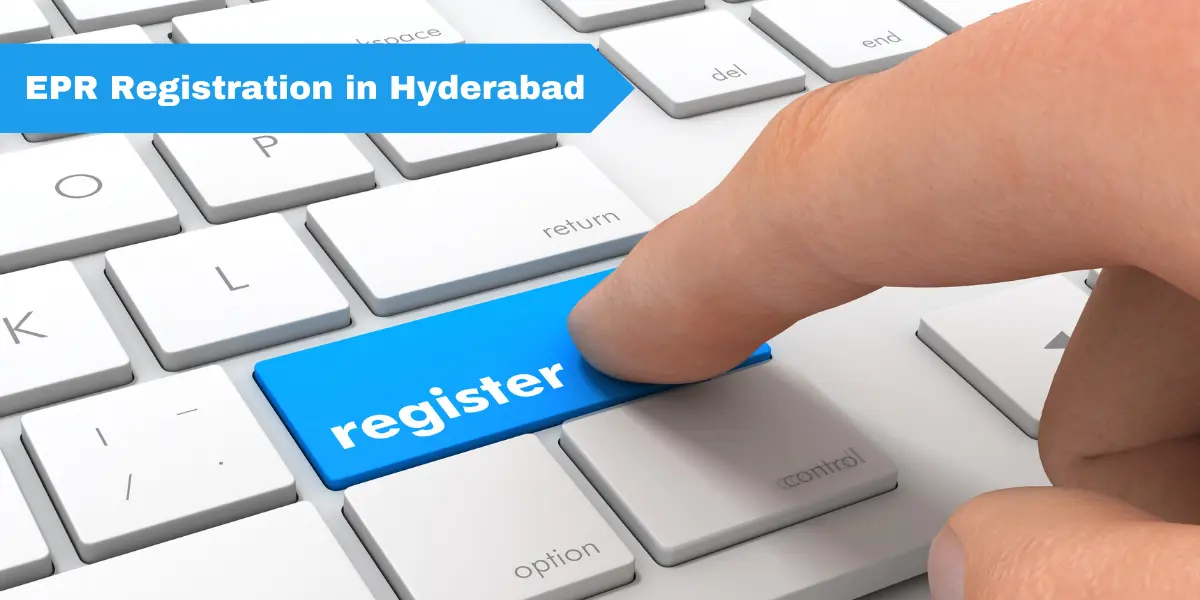As per the Government of India EPR waste management rule, Battery Waste Management Rules, 2022, Plastic Waste Management Rules, 2016, and E-Waste (Management) Rules, 2016, it is mandatory for producers, importers, brand owners, and bulk consumers to obtain EPR Registration in Hyderabad and responsibly handle electronic waste, plastic waste, or battery waste.
EPR Registration in Telangana and in PAN India is a system that puts the responsibility of safe disposal and management of electronic waste, plastic waste, or battery waste on the producer or manufacturer of the product. This system ensures that the producers or manufacturers are accountable for the waste generated from their products and encourages them to implement better waste management practices.
If you are a business that deals with electronic waste, plastic waste, or battery waste, you are required to register for EPR Authorization with the appropriate regulatory body.
Who is Applicable to Obtain EPR Registration in Hyderabad?
|
|
Electronic Waste
|
Plastic Waste |
Battery Waste |
|
Producer
|
Yes
|
Yes
|
Yes
|
|
Importer
|
Yes
|
Yes
|
Yes
|
|
Brand Owner
|
Yes
|
Yes
|
Yes
|
|
Bulk Consumer
|
Yes
|
No
|
No
|
Why Government introduced EPR Registration in Telangana?
The Indian government introduced Extended Producer Responsibility (EPR) authorization for producers, importers, and brand owners to ensure that they take responsibility for the waste generated by their products and to encourage them to adopt more environmentally sustainable practices. Under EPR regulations, producers, brand owners, importers, bulk consumers, etc. are mandated to establish collection and disposal systems for the waste generated by their products.
- The EPR Certificate in Hyderabad system helps to ensure that producers, importers, and brand owners are held accountable for the environmental impact of their products.
- By requiring them to establish a waste management system, the government hopes to encourage these stakeholders to adopt more environmentally sustainable practices and to reduce the amount of waste from the environment.
- To promote sustainable development and protect the environment and create a more sustainable and environmentally friendly economy in India.
Why is EPR Certificate in Hyderabad Necessary?
EPR registration in Hyderabad is necessary because it helps to promote sustainable waste management practices and reduce the environmental impact of certain products. Here are some reasons why EPR registration is necessary:
- Responsibility for waste management: EPR registration makes producers, importers, and brand owners responsible for the waste generated by their products throughout the product's lifecycle, from production to disposal. This encourages them to adopt more sustainable and environmentally friendly practices.
- Reduction of waste: EPR registration helps to reduce the amount of waste that ends up in landfills or the environment by encouraging producers to design products that can be easily recycled and by promoting the recycling and proper disposal of waste.
- Encouragement of circular economy: EPR registration encourages the creation of a circular economy where waste is minimized, and resources are conserved. This can lead to economic benefits and reduce the environmental impact of production.
- Compliance with regulations: EPR registration is often a legal requirement in many countries, including India. Producers, importers, and brand owners who fail to comply with EPR regulations may face fines and penalties.
What are the Compliance Requirements Post-EPR Certificate in Hyderabad?
Once an entity has been authorized under EPR, there are certain compliance requirements that must be met to ensure that they continue to operate in compliance with the regulations. Here are some of the compliance requirements that post EPR authorization:
- Meeting collection targets: EPR-authorized entities are required to meet collection targets for the products covered under the authorization. These targets are set by the Central Pollution Control Board (CPCB) or State Pollution Control Board (SPCB) and must be met to remain in compliance.
- Ensuring proper disposal and recycling: EPR-authorized entities must ensure that the waste generated by their products is properly disposed of and recycled. This includes working with authorized recyclers or setting up their own recycling infrastructure.
- Maintaining records: EPR-authorized entities are required to maintain records of the waste generated and the disposal or recycling process followed. This information must be submitted to the CPCB as and when required.
- Submitting reports: EPR-authorized entities are required to submit annual reports to the CPCB or SPCB outlining their compliance with the regulations. These reports must include information on the amount of waste generated, the amount collected, and the amount recycled or disposed of.
- Payment of fees: EPR-authorized entities are required to pay fees for the authorization, as well as for meeting collection targets and other compliance requirements.
How ASC Group Will Help You in Getting EPR Registration in Hyderabad?
At ASC Group, we can assist you in obtaining EPR Registration in Hyderabad, Warangal, Nizamabad, Mahbubnagar, and all states of Telangana and ensuring that your business is compliant with the EPR regulations. Our team of professionals can guide you through the registration process, help you prepare the necessary documents, and ensure that you meet all the requirements.
- Assists to comply with EPR Compliance and regulations as per the legal obligations
- Advice in the implementation of waste management programs like collection, recycling, etc.
- Arranging the transportation & Logistics from collection points, recycling channel, reverse logistics facility, etc.
- Arrange in filing annual and quarterly returns with the CPCB department
- Issuance of an EPR Registration certificate from the CPCB department.
- Assists in implementing the mechanism of the Take Back / Buy Back mechanism.
- Help producers with solutions to the complex landscape of EPR regulations and manage the waste of their products to meet legal requirements and promote sustainable waste management activity.


























































